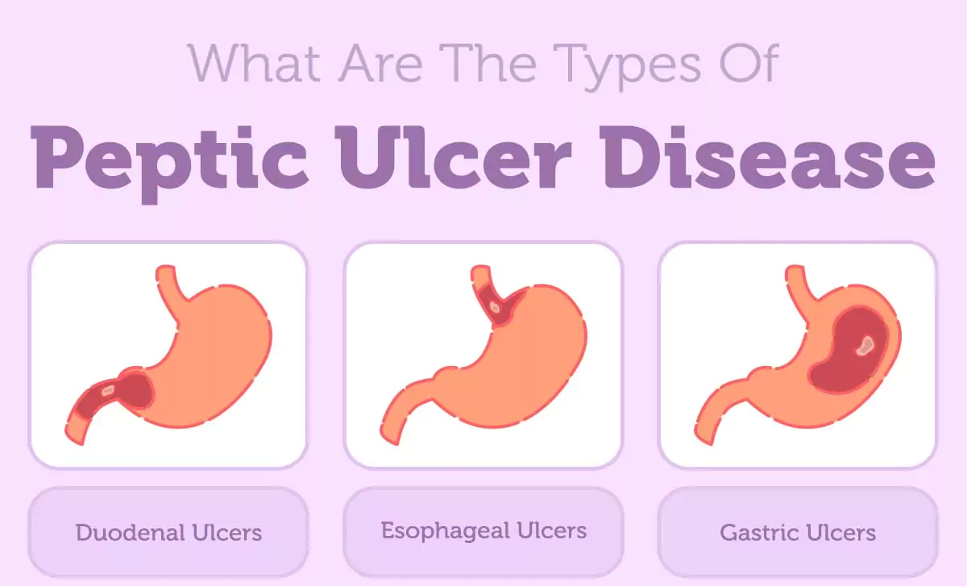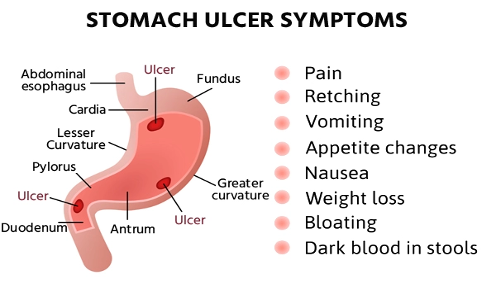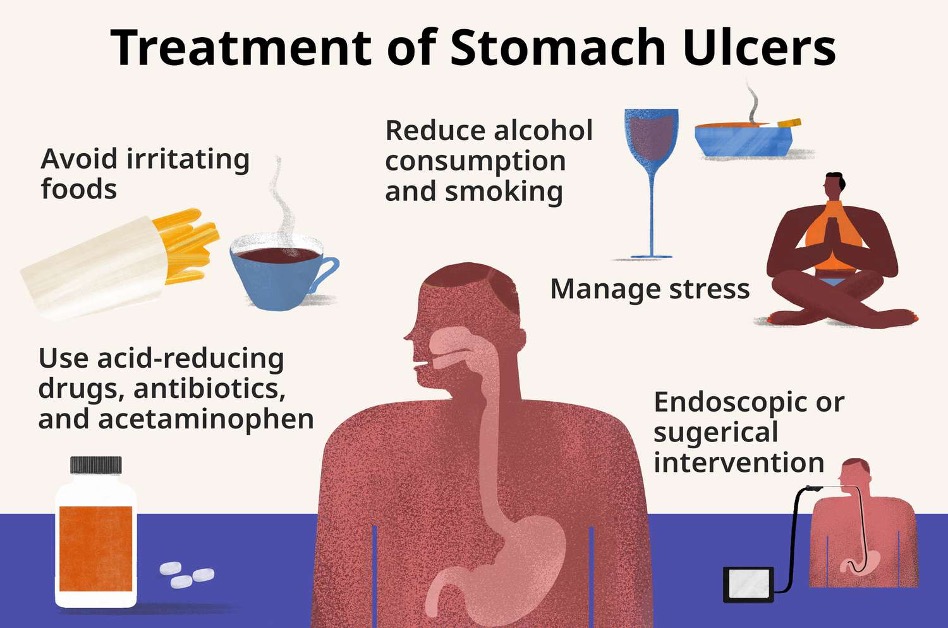- What is stomach ulcer?
- Types of stomach ulcers
- What causes stomach ulcers?
- Risk factors for stomach ulcers
- Transmission of helicobacter pylori infection
- Symptoms of stomach ulcer
- Diagnosis of stomach ulcer
- Treatment for a stomach ulcer
- Prevention and management of stomach ulcer
A stomach ulcer is a painful break, wound or sore that develops in the tissue lining of the stomach or in the digestive tract. Normally, stomach ulcers are found in the stomach, but they can also develop in the oesophagus or small intestines.
Most doctors refer to stomach ulcers as peptic ulcers. Therefore, remember that both peptic ulcers and stomach ulcers are interchangeable and can mean the same thing.

There are three types of stomach ulcers as listed below:
- Gastric ulcers – develop inside the lining of the stomach.
- Duodenal ulcers – develop inside the upper small intestine or duodenum.
- Oesophageal ulcers – develop above the stomach in the oesophagus.
Epidemiology of stomach ulcer
Stomach ulcer or peptic ulcer disease has a global prevalence of 5-10% and affects four million people in the world. Studies have demonstrated a steady decline in the prevalence of peptic ulcer disease, but both incidence and complications remain upward, possibly due to an increase in risky behaviours or lifestyle factors. Incidence, prevalence, and mortality of peptic ulcer disease are higher in males compared to females, with duodenal ulcers being four times more common than gastric ulcers.
Regionally and globally, South Asia bears the highest prevalence rate. Africa has low prevalence of peptic ulcer disease but bears the highest pooled prevalence of helicobacter pylori infection, the major cause of peptic ulcer disease. Helicobacter pylori(H. pylori) infection accounts for 90% of duodenal ulcers and more than 70% of gastric ulcers. The acquisition of H. pylori infection occurs more in childhood.
Low socio-economic status is strongly associated with helicobacter pylori infection. Thus, treating and controlling helicobacter pylori infection has the highest potential to bring down both the incidence and prevalence of peptic ulcer disease in areas where helicobacter pylori infection is more prevalent such as in Africa.
Main causes of stomach ulcers are:
- Infection with helicobacter pylori bacterium.
- Long – terms use of Non-steroidal anti-inflammatory drugs (NSAIDs).
- In rare cases, stomach cancer.
Stomach ulcerdevelops when an acid, bacteria or certain medications causedamage to the mucosa, the tissue that protects the lining of the stomachfrom being destroyed by acid, bacteria, and drugs.
The major cause of stomach ulcers is a helicobacter pylori infection. This bacterium is responsible more than 60% of all stomach ulcers. Long-term used of anti-inflammatory drugs can cause stomach ulcers. The third cause of stomach ulcers is stomach cancer although the cases are very small.
Note:Many cases of stomach ulcers are caused by helicobacter pylori infection. Therefore, it is very important that you get tested for helicobacter pylori if you are suffering from stomach ulcer.
Risk factors for stomach ulcers

The main risk factors that cause stomach ulcer are helicobacter pylori infection and long term used of Non-steroidal anti-inflammatory drugs (NSAIDs). These risk factors together with the acid in the stomach can destroy mucosa tissue and cause stomach ulcer.
In addition, the following factors can increase the chance of gettingstomach ulcers. These risk factors alone do not cause stomach ulcers, but they can make the stomach ulcers worse and difficult to heal.
- Smoking
- Drinking too much alcohol
- Consumption of spicy or processed foods
- Too much caffeine from coffee or tea
- Long termed use of pain relief medication including ibuprofen and aspirin
Transmission of helicobacter pylori infection
Helicobacter pylori infection is very contagious and can be transmitted within the family. It can be transmitted from one person to another. This means it can also be transmitted from a parent to a child. As a result, you must get everyone in your family tested for helicobacter pylori infection if you are diagnosed with stomach ulcers caused by helicobacter pylori infection.

Note: The best way to protect yourself from getting stomach ulcer is to get treated for helicobacter pylori infection if you are diagnosed. You must get tested for this infection If you have a family member suffering from stomach ulcer caused by helicobacter pylori infection.
Here are the ways helicobacter pylori infection can be transmitted:
- Coming in contact with any infected person
- Eating contaminated food or water
- Sharing of toothbrushes
- Sharing of food and plates
- From person to person by close contact, e.g. kissing
- Sharing of waters or drinking from the same drinking glass

You will experience the following symptoms if you are suffering from stomach ulcer:
- Burning pain in the stomach
- Bloating in stomach
- Pain on an empty stomach
- Indigestion of food
- Upper Abdominal pains, especially after eating and at night
- Nausea and vomiting
- Dark blood vomitor in the stool
- Loss of appetite and weight loss
- Fatigue and weakness of the body
If your doctor suspects a stomach ulcer, they will order the following tests:
- Endoscopy – A stomach ulcer can be diagnosed by Endoscopy. During endoscopy, a thin tube with a camera is inserted from oesophagus to the stomach to visualise stomach and check for ulcers within oesophagus, stomach, and small intestine.
- Biopsy – during endoscopy, a small tissue is removed and sent for examination in the lab. This biopsy is also performed to check the presence of helicobacter pylori.
- If ulcers and bacteria are found, treatment can follow after.
- Laboratory tests for H. pylori – in order to diagnose a stomach ulcer caused by bacteria, your doctor will test for bacteria using blood, stool, or breath test. Breath test is the most accurate test that checks for the presence of bacteria.

The main goal of treating the stomach ulcer is to reduce the acid in the stomach and heal the ulcers in the stomach. If the ulcer is caused by bacteria, antibiotics are the best treatment.
Here is the overview of stomach ulcer treatment:
Antibiotics
- Treatment for stomach ulcers includes the use of antibiotics to treat H. pylori infection.
- Antibiotics are normally prescribed along with acid-suppressing medications in the triple therapy for about two to eight weeks.
- Antibiotics are prescribed for about two weeks.
Acid-suppressing medications
- Once you have completed the antibiotics, you will start taking acid-suppressing medications for up to 8 weeks.
- Sometimes, acid-blocking medications may be given intravenously in severe cases.
- Other medications to reduce stomach acid and to heal stomach ulcers can be prescribed. Example of these medications are: the proton pump inhibitors, histamine blockers, H2-receptor antagonists like Ranitidine or Carafate.
- Remember, you may try to manage your symptoms naturally without relying on long term use of medications.
Conventional treatment
- Blood transfusion is recommended if ulcers cause severe bleeding.
- In rare cases, surgery may be recommended to treat a perforated peptic ulcer.
Lifestyle modifications
- Stop taken anti-inflammatory medicationssuch as NSAIDs
- Stop smoking, alcohol, caffeine, and spicy foods
Repeatedtests
- If you still experiencing pain or symptoms after the full course of treatment, you will need to see your doctor again
- Your doctor will order another test to check If helicobacter pylori is gone
Prevention and management of stomach ulcer

The best way topreventstomach ulcer is by:
- Treating helicobacter pylori infections
- Avoid long-term use of pain medications such as NSAIDs, aspirin, Ibuprofen etc.
- Use antacids and acid-reducing medications
- Avoid overeating and change diet to healing foods
Best Foods that heal stomach ulcer
- Bone broth
- Sweet potato
- Cabbage juice
- Chamomile tea
- Aloe Vera juice
- Fibre-rich foods
- Take supplements
- L-glutamine powder
- Soil-based probiotics
- Foods with probiotics
- Steamed vegetables, carrots, asparagus
Worst foods for stomach ulcer
- Sugar
- Tomato
- Alcohol
- Caffeine
- Chocolate
- Spicy foods
- Fatty foods
- Citrus fruits
- Acidic foods
- Processed foods
- Large quantities of nuts and seeds
How long does it take for a stomach ulcer to heal?
- It can take weeks to 3 months to heal stomach ulcer if right treatment is administered or proper management is followed.
- Some stomach ulcers may come back if treatment is not followed appropriately.
- It is very important you take your medication correctly.
In summary
- Majority of stomach ulcers are caused by helicobacter pylori infection.
- If this infection is not treated, stomach ulcer and other complications may develop.
- People who are suffering from stomach ulcers need to be tested for helicobacter pylori and get treatment immediately before severe complications develop.
- Helicobacter pylori infection is very contagions and can be transmitted easily from one person to another person, but it can be treated with antibiotics.
- Get your family members including your children tested for helicobacter if you are suffering from ulcers caused by helicobacter pylori infection.


Chøl M Atem
Thank you very much, this is a very nice article and educative as well. I heard that it can also be caused by extreme hunger situation, how true is this belief?
Chøl M Atem
Thank you very much, this is a very nice article and educative as well. I heard that it can also be caused by extreme hunger situation, how true is this belief? Kindly clarify this if you can.